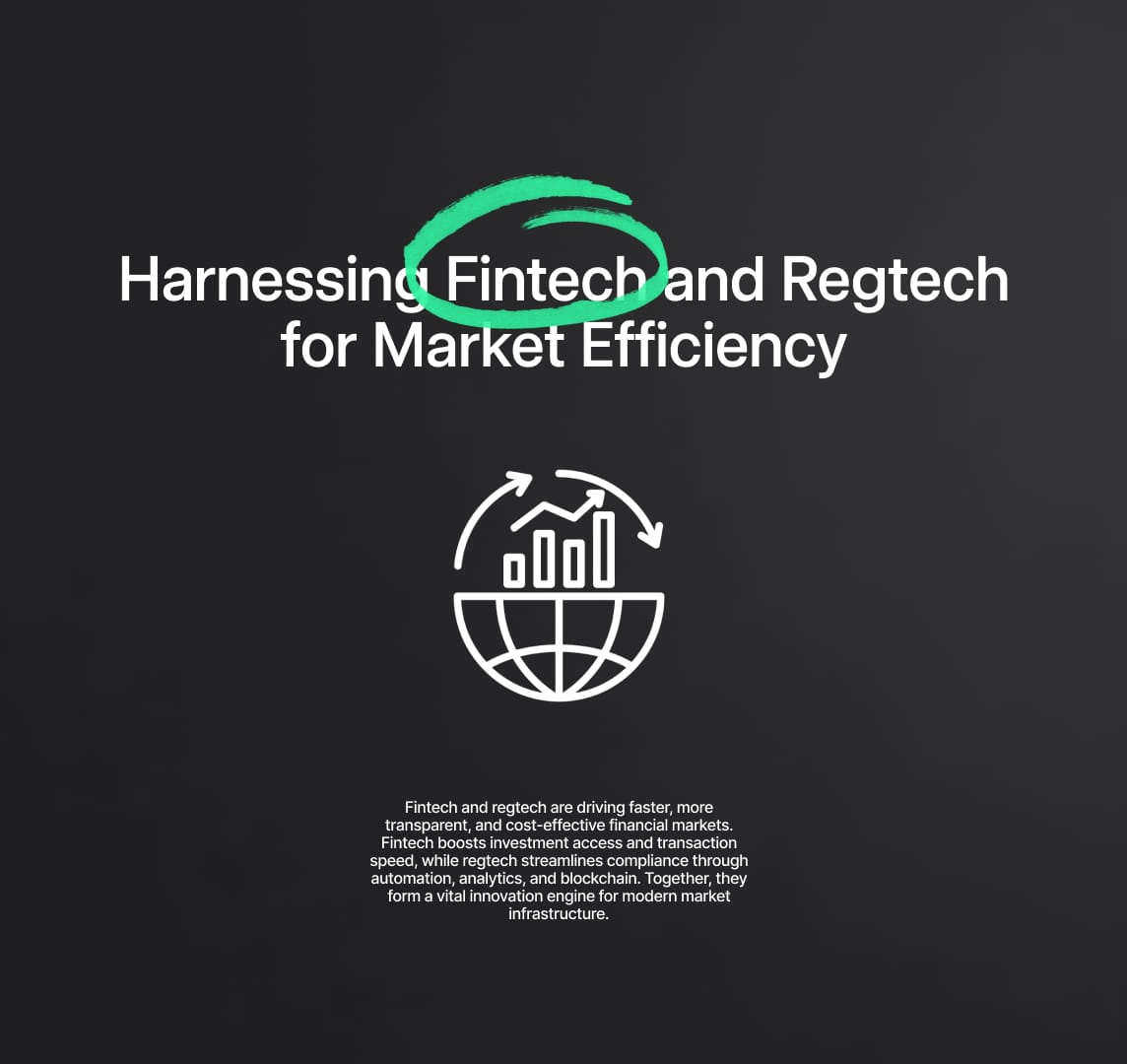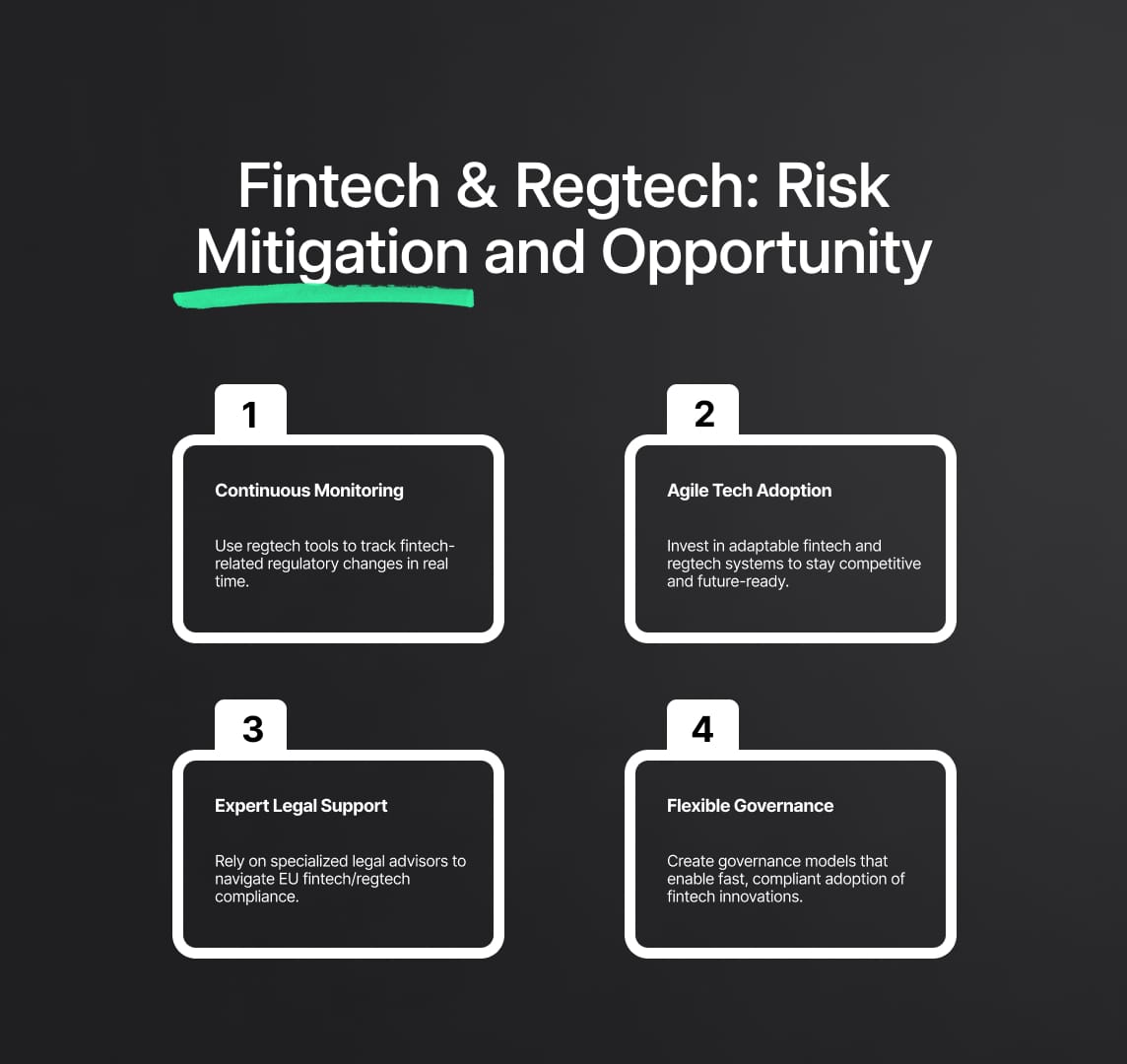Integration of Fintech and Regtech in Capital Markets
This article explores how these technologies are transforming market efficiency while presenting regulatory challenges. Learn strategies for mitigating risks and seizing opportunities in this digital frontier, from continuous regulatory monitoring to governance.

The Role of Fintech and Regtech in Transforming Europe's Capital Markets Union
Digitalisation plays an indispensable role in the creation of the Capital Markets Union (CMU) which is aimed at making Europe more competitive. The urgency to advance in this project is to stimulate investments and enable innovations. Dr. Thorsten Pötzsch, Executive Director of Securities Supervision at BaFin, states that approximately half of the ongoing digitalization regulatory initiatives intersect with the capital market. This means it is impossible to regulate the capital market without considering digitalization. Fintech aids in processing transactions and information faster, facilitating businesses and investors across Europe with access to capital and enhancing transparency in financial markets. It has the potential to reduce complexity, which should not be wasted by overzealous legislation. The objective is to enhance Europe's appeal and safety for financial service providers. This can only be achieved by simpler, clearer laws and not by creating a complexity spiral that could hinder innovations.

Navigating the Digital Frontier: Regtech, Fintech, and the Capital Markets Union in Europe
The European Union's ambitious financial project, the Capital Markets Union (CMU), is increasingly embracing the transformative power of fintech and regtech to reshape the continent’s financial markets. For capital markets participants, from stock exchanges to brokers, and emerging fintech companies, the stakes have never been higher.
Harnessing Fintech and Regtech for Market Efficiency
The integration of fintech within the CMU has already signaled a move towards a more streamlined, transparent, and efficient financial market. Fintech enables fast, secure transactions and opens up new avenues for investment and funding. But alongside fintech, regtech is also becoming a cornerstone of market innovation. Regulatory technology, or regtech, aims to use technology to help firms better comply with regulations efficiently and at a lower cost. Together, fintech and regtech promise to revolutionize market operations through advanced algorithms, real-time data analytics, blockchain technologies, and automated compliance solutions. It's not merely an ongoing trend; it's a critical transformation imperative for financial institutions aiming to stay ahead in a rapidly evolving landscape.
Regulatory Challenges: Striking a Balance with Fintech and Regtech
The Executive Director of Securities Supervision at BaFin, Thorsten Pötzsch, has stressed the intricacies of regulatory initiatives related to digitalization and its inevitable intersection with the capital markets. The challenge here is twofold:
- How to integrate fintech solutions without compromising market integrity.
- How to leverage regtech to navigate a labyrinth of regulations without stifling innovation.
Achieving this delicate balance is critical to avoiding a complexity spiral that could paralyze financial innovation. Regtech solutions bridge innovation and compliance by utilizing analytics and automation to ensure firms stay on the right side of the regulatory line.
The Imperative of Immediate and Ongoing Compliance in Fintech and Regtech
Financial institutions must adopt a proactive stance towards the ever-changing regulations and technological advancements in fintech and regtech. Real-time monitoring and compliance checks are no longer optional. Institutions must engage continuously with regulatory bodies and make real-time adjustments, a process made simpler through regtech solutions.

Mitigating Risks and Seizing Opportunities with Fintech and Regtech
To navigate these complexities, institutions should focus on:
- Continuous Regulatory Monitoring: Leveraging regtech solutions to stay updated with legislative shifts concerning fintech and digital transformation.
- Agile Technological Investments: Utilizing both fintech and regtech solutions to make systems adaptable to new technologies, thereby staying ahead of the competition.
- Legal Guidance: Employing experts specializing in fintech and regtech compliance to navigate the EU's financial regulatory environment.
- Innovation-Centric Governance: Building a flexible governance framework that can swiftly implement new fintech and regtech solutions while ensuring compliance with regulations.
The Road Ahead: Fintech and Regtech in the European Financial Landscape
The timeline for implementing these sweeping changes is in the short to medium term. The success of the CMU and the European financial market hinges on how effectively the power of fintech and regtech can be harnessed. As digital transformation continues to unfold, the integration of fintech and regtech solutions will be instrumental in defining the future of European finance. Financial institutions should swiftly adopt regtech solutions to navigate the fintech landscape, ensuring compliance and fostering innovation.
To thrive in the digital financial markets of 21st-century Europe, strategic fintech and regtech focus, along with vigilant regulatory compliance, is crucial.
By embracing fintech and regtech in this transformative journey, financial institutions can optimize both innovation and compliance, setting a course for success in the dynamic European financial ecosystem.
Reduce your
compliance risks

